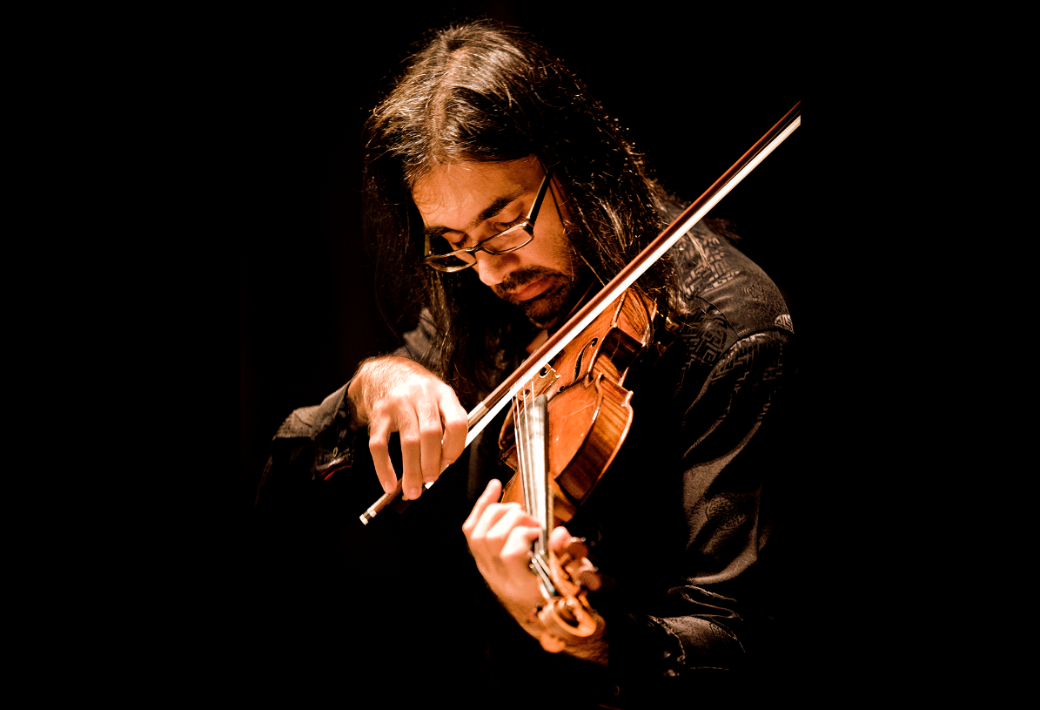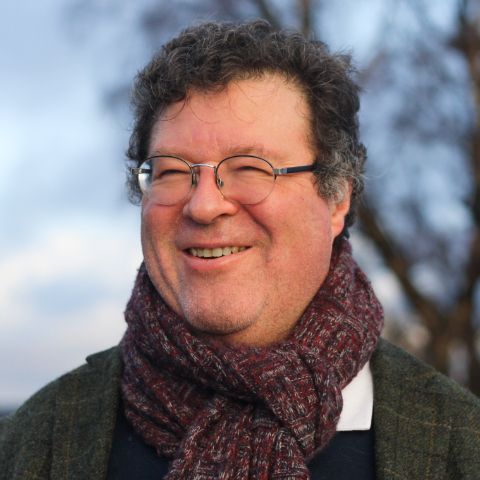Leonidas Kavakos hasn’t had his breakfast. It’s easy to imagine the career of a famous soloist as glamorous, but when we catch up he’s in a hotel in Hong Kong, still recovering from the long-haul flight from his home in Zurich. No great surprise: since he first astonished audiences in the early 1990s, the Greek violinist has forged a reputation not just as a formidable virtuoso but also as a deeply engaged musical collaborator. Every orchestra wants to perform with him, and tomorrow it’s the Hong Kong Philharmonic’s turn. “I went out to look for something to eat, and I got lost”, he laughs. “But now I’m here”.

He’s also here to talk about his forthcoming appearance with another flagship Asian orchestra, the Singapore Symphony Orchestra – with whom he’s scheduled to perform Tchaikovsky’s Violin Concerto in October with the orchestra’s Music Director Hans Graf. The Tchaikovsky is one of those concertos that are too often dismissed as “warhorses”, and Kavakos must have played it countless times. But if he’s feeling even a trace of over-familiarity, he doesn’t show it. “Well, yes”, he says.
“It’s one of these works that you play more or less the whole time, but it is also one of the most beautiful concertos we have. Unfortunately, there is not enough that Tchaikovsky wrote for the violin: apart from the concerto, he wrote a couple of smaller pieces with orchestra, and then some chamber music – some of which is fantastic, like the Piano Trio and Souvenir de Florence. But apart from that, there’s not really much else. It's quite unfortunate.”
“First of all, the concerto is not at all dramatic. We have Tchaikovsky pieces that have huge drama – think about the Piano Trio, for instance. Compared to that, the concerto is a very serene work. Happy is not the right word – there is a lot of melancholy. But it’s very lyrical, very song-like in a way, especially the first and second movements. Of course, it comes after Beethoven – he was the first who wrote against the tradition of the violin concerto. The most fascinating thing – the most challenging thing – about the Beethoven, Brahms, and Tchaikovsky concertos is that the first movements alone are so huge: they’re 20 to 23 minutes, practically as long in themselves as any concerto that was written before”.
The Tchaikovsky concerto “demands a lot of input, emotionally,” he says. “But at the same time, one has to maintain an incredibly precious clarity. There is a purity in the music that you have to be really sure not to lose. The music is so transparent – it's almost like a romantic Mozart. When we think of Russia nowadays, we think mostly of Soviet power. Tchaikovsky is a totally different story. When you go to St Petersburg, architecturally it’s like an Italian city. And this is very much the atmosphere that Tchaikovsky has in the violin concerto: these incredibly beautiful buildings, the one next to the other in all the colours that you can imagine, with water running in between”.
It’s a captivating metaphor, but that’s Kavakos all over. He’s an artist with a sharp and lively mind; an artist who thinks differently – after all, he made his first big splash in 1991 by recording the previously unheard (and fiendishly difficult) original version of the Sibelius Violin Concerto. That curiosity has sustained him, making works like the Tchaikovsky still feel fresh. He likes to quote his teacher, the late Greek violinist and conductor Stelios Kafantaris (1928–2003), who said that a soloist should play a concerto for years before performing it in public – so that when they step on stage, they already have a lifetime’s experience to share. Does it ever get easier to play these big warhorse concertos?
“It can get easier if you just keep on doing what you’ve been doing. But when you study a work, it's inevitable that new things appear, even though it might be a concerto that I have played a lot in my life. All of a sudden, I start doubting everything – I start questioning everything, I start disliking everything. And then, in a way, you just start again from the beginning – which does not make it any easier, that’s for sure! With age, you can realise faster and sooner what is important, and what is not. You are more of a complete artist, so the studying process is easier. The problem is that what comes out of the study is much harder to realise”.
Increasingly, Kavakos attaches a special value to chamber music, and the close musical relationships that it brings. That’s on the menu in Singapore too: a recital of violin sonatas by Poulenc, Ravel, Debussy and Franck with Kavakos’ frequent collaborator, the pianist Enrico Pace. He can’t wait.
“I really like to do recitals and I love playing chamber music. I used to have my own chamber music festival. Now I go to the Verbier Festival every year to play chamber music, and I really enjoy that. With a recital, you get to play three or four big pieces and for two hours you develop, with the audience, an atmosphere that is really unique. I love that. And also, the repertoire is amazing: in Singapore we’re playing Ravel and Debussy and Poulenc and Franck – people who didn’t really write anything for violin and orchestra. So these sonatas are the main compositions for the violin from these great composers.”
“It's great to have this repertoire, and it’s even more important to play it. And therefore, whenever I have a chance to do so, I really try to play it as much as I can.” Kavakos has been performing together with Enrico Pace for more than 20 years. “But I’ve also played with quite a lot with Yuja Wang,” he says, “I’ve played with Emanuel Ax. For me, recitals with piano are always…” He pauses. “Actually, I prefer it to playing with an orchestra because you are experiencing a journey with the audience. You get to make your own programmes – it’s as if you are conducting, in a way”.
And that leads us to another side of Kavakos’ artistry. For a period, from 2007, he conducted Salzburg’s Mozarteum Orchestra. More recently he’s built up a portfolio guest-conducting career that’s seen him directing (among others) the New York Philharmonic, the Chamber Orchestra of Europe and the Budapest Festival Orchestra. Does he hanker after a permanent conducting post with a major orchestra?
“One thing that I realised early on was that I was never ambitious,” he says. “I think that life knows always better what to bring. Of course, that doesn't mean that you just sit on the couch waiting – you have to go out there and work, prepare and dream, and try and make things happen. But conducting has always been very fascinating to me, especially after I heard Bruckner for the first time, because the orchestral sound in Bruckner is something that you just can't copy. Of course, I started much smaller, with a chamber orchestra. Then later it developed into much bigger repertoire. Having said that, I’m not going to be doing only Bruckner”.
He can say that again: already in 2023, he’s conducted Prokofiev’s massive Sixth Symphony, as well as Haydn and Brahms. But here, again, it’s that chamber music impulse at work – the desire to make music as part of a team. “As a soloist you have your back to the orchestra most of the time. As a conductor, you’re talking to them; you can communicate with the musicians. And you have the challenge to create a sound, just as you do when you play the violin. But it’s a much more communicative thing than playing as a soloist or being alone on stage doing Bach, or whatever”.
And communication, it seems, is what makes Leonidas Kavakos tick. For now, he has Tchaikovsky to rediscover – and breakfast to find. Neither can be taken for granted. But behind it all lies that one, constant impulse, without which he wouldn’t be the artist he is. “I just love to communicate with people” he says. “One of the biggest problems of our time is the lack of understanding and compassion and solidarity for each other. We are creating, maybe, some kind of a cacophony in society. But chamber music tells us – ‘Look guys, whoever you are, we love you, we appreciate you, whatever. But now, please let’s sit down and try to make something good together’.”
Leonidas Kavakos performs Tchaikovsky’s Violin Concerto with Hans Graf and the Singapore Symphony Orchestra on 13th and 14th October at Victoria Concert Hall. His recital with Enrico Pace is on Sunday 15th October.
This article was sponsored by the Singapore Symphony Orchestra.


